高中英语Unit1FestivalsaroundtheworldLearningaboutLanguage教案新人教版必修
高一Unit 1《Festivals around the world》教案人教版
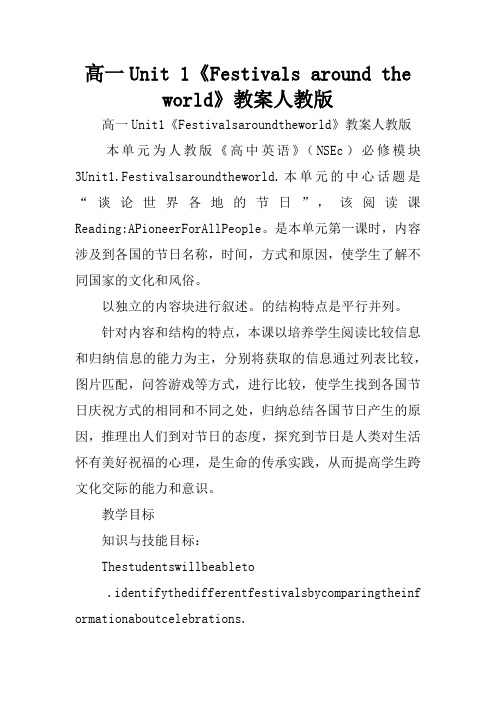
高一Unit 1《Festivals around theworld》教案人教版高一Unit1《Festivalsaroundtheworld》教案人教版本单元为人教版《高中英语》(NSEc)必修模块3Unit1.Festivalsaroundtheworld.本单元的中心话题是“谈论世界各地的节日”,该阅读课Reading:APioneerForAllPeople。
是本单元第一课时,内容涉及到各国的节日名称,时间,方式和原因,使学生了解不同国家的文化和风俗。
以独立的内容块进行叙述。
的结构特点是平行并列。
针对内容和结构的特点,本课以培养学生阅读比较信息和归纳信息的能力为主,分别将获取的信息通过列表比较,图片匹配,问答游戏等方式,进行比较,使学生找到各国节日庆祝方式的相同和不同之处,归纳总结各国节日产生的原因,推理出人们到对节日的态度,探究到节日是人类对生活怀有美好祝福的心理,是生命的传承实践,从而提高学生跨文化交际的能力和意识。
教学目标知识与技能目标:Thestudentswillbeableto.identifythedifferentfestivalsbycomparingtheinf ormationaboutcelebrations.2.explainthereasonwhythefestivalscomeintobeingbyfin dingoutthesimilaritiesanddifferences.3.describetheirfavoritefestivalsbyusingthelanguagef romthetext.教学重点和难点)为全体学生进行有效性阅读策略的指导,包括语篇分析、猜测词义,逻辑推理、归纳概括等技巧。
2)通过比较信息,归纳总结各国节日产生的原因,推理出人们到对节日的态度和节日的意义。
教学过程教学步骤教学活动设计意图Pre-reading:Step1.Brainstorm:motivatetheSsbyaskingsomequestions.Q1:Doyouanyfestivalsaroundtheworld?Step2.matchthecelebrationwiththefestivals.Q2:DoyouknowhowpeoplecelebratetheseFestivals?Doaquiz.Step2.DiscussionSsdiscussthefollowingquestionsQ1:Howdotheycomeintobeing?Q2:whatdotheyhaveincommon?Andwhataretheredifference amongthem?问题引发了学生的思考,调动学生的已知,将学生的思维活动引导到课文主题上来。
《高中英语新课标-必修1-Unit1 Festivals around the world 课件》

不同国家和文化中的节日
了解世界各国和不同文化中的庆典与节日,体验不同人群庆祝节日的方式, 感受文化的多样性与人类共同的欢庆。
节日的文化意义
探究节日在不同文化中的重要地位,了解它们对于文化传统、身份认同和价 值观的深远影响。
节日的历史渊源
追寻节日的历史根源,了解节日与人类历史和传统之间的联系,以及随着时 间推移如何演变和发展。
宗教节日及其意义
探索各大宗教中的重要节日,了解它们在信仰和宗教-必修1Unit1 Festivals around the world 课件
Explore the fascinating world of festivals! From cultural celebrations to religious traditions, discover the rich tapestry of festivals that bring joy and meaning to people around the globe.
为什么庆祝节日?
了解不同文化中庆祝节日的原因,从人们的欢乐和团结之中体会为什么庆祝节日的重要性。
世界各地不同类型的节日
探索世界各地独特的节日,从传统文化节日到现代庆典,领略各种不同类型 的节日给人们带来的喜悦与意义。
节日 - 生活的庆祝
了解节日作为人们庆祝与享受生活的方式,体验节日带来的喜庆氛围与人们 团聚的温暖。
人教版高一英语必修三Unit1Festivals around the world教案设计
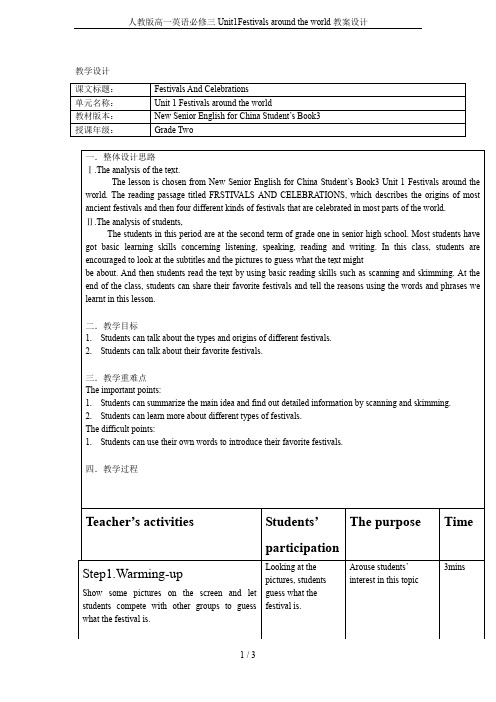
二.教学目标 1. Students can talk about the types and origins of different festivals. 2. Students can talk about their favorite festivals.
三.教学重难点 The important points: 1. Students can summarize the main idea and find out detailed information by scanning and skimming. 2. Students can learn more about different types of festivals. The difficult points: 1. Students can use their own words to introduce their favorite festivals.
人教版高一英语必修三 Unit1Festivals around the world 教案设计
教学设计
课文标题: 单元名称: 教材版本: 授课年级:
Festivals And Celebrations Unit 1 Festivals around the world New Senior English for China Student’s Book3 Grade Two
Step2.Reading
. Ask the students to find out the subtitles, fill in
the blanks and analysis the text.
Students can find
out the subtitles
Unit1Festivalsaroundtheworld课文知识点解析
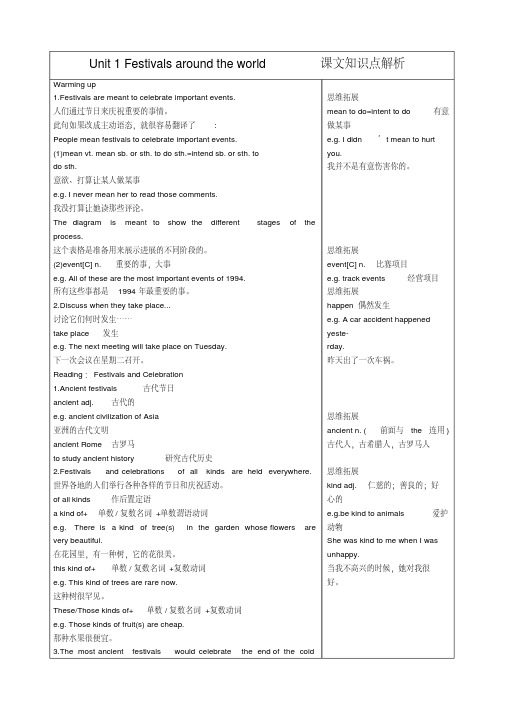
Unit 1 Festivals around the world 课文知识点解析Warming up1.Festivals are meant to celebrate important events.人们通过节日来庆祝重要的事情。
此句如果改成主动语态,就很容易翻译了:People mean festivals to celebrate important events.(1)mean vt. mean sb. or sth. to do sth.=intend sb. or sth. todo sth.意欲、打算让某人做某事e.g. I never mean her to read those comments.我没打算让她读那些评论。
The diagram is meant to show the different stages of the process.这个表格是准备用来展示进展的不同阶段的。
(2)event[C] n.重要的事,大事e.g. All of these are the most important events of 1994.所有这些事都是1994年最重要的事。
2.Discuss when they take place...讨论它们何时发生……take place 发生e.g. The next meeting will take place on Tuesday.下一次会议在星期二召开。
Reading:Festivals and Celebration1.Ancient festivals 古代节日ancient adj. 古代的e.g. ancient civilization of Asia亚洲的古代文明ancient Rome 古罗马to study ancient history 研究古代历史2.Festivals and celebrations of all kinds are held everywhere. 世界各地的人们举行各种各样的节日和庆祝活动。
高一英语Unit 1 Festivals around the world (1) 人教实验版知识精讲
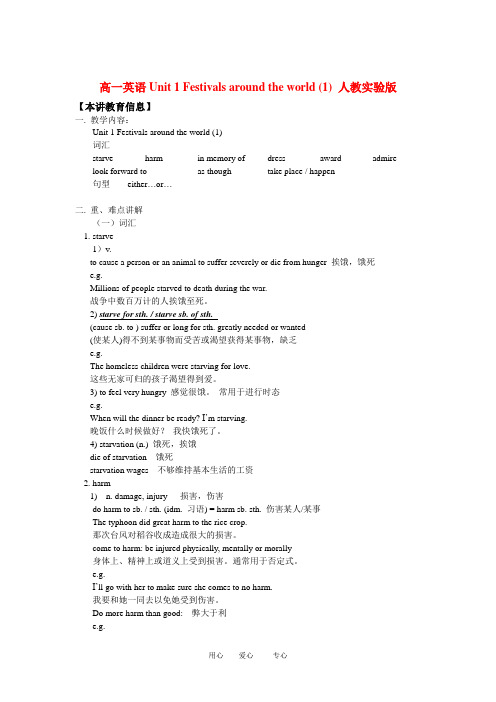
高一英语Unit 1 Festivals around the world (1)人教实验版【本讲教育信息】一. 教学内容:Unit 1 Festivals around the world (1)词汇starve harm in memory of dress award admire look forward to as though take place / happen句型either…or…二. 重、难点讲解(一)词汇1. starve1)v.to cause a person or an animal to suffer severely or die from hunger 挨饿,饿死e.g.Millions of people starved to death during the war.战争中数百万计的人挨饿至死。
2) starve for sth. / starve sb. of sth.(cause sb. to ) suffer or long for sth. greatly needed or wanted(使某人)得不到某事物而受苦或渴望获得某事物,缺乏e.g.The homeless children were starving for love.这些无家可归的孩子渴望得到爱。
3) to feel very hungry 感觉很饿。
常用于进行时态e.g.When will the dinner be ready? I’m starving.晚饭什么时候做好?我快饿死了。
4) starvation (n.) 饿死,挨饿die of starvation 饿死starvation wages 不够维持基本生活的工资2. harm1) n. damage, injury 损害,伤害do harm to sb. / sth. (idm. 习语) = harm sb. sth. 伤害某人/某事The typhoon did great harm to the rice crop.那次台风对稻谷收成造成很大的损害。
人教版高中英语必修三Unit1Festivalsaroundtheworld课文知识点解析
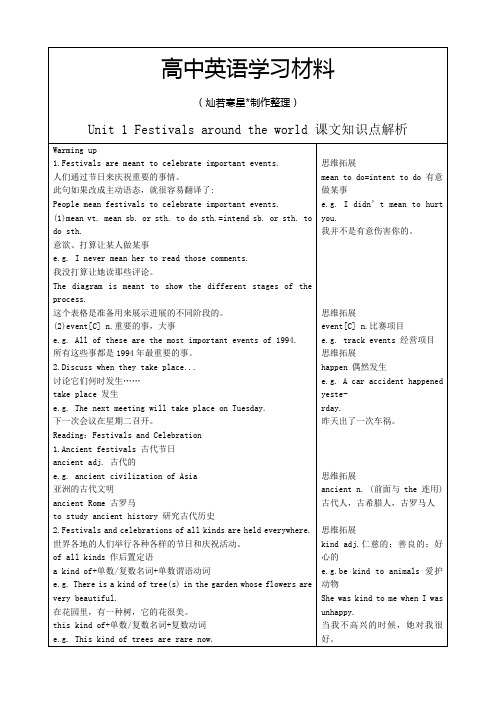
happy memories of his stay in London
对在伦敦幸福的记忆
8.lead the ancestors back to earth
把祖先带回到地球
lead sb. to...把某人带到……
e.g. He led us to his home.
plenty n./pron. 足够;大量
e.g. years of peace and plenty 太平丰收年
There is plenty of room in my bag.
我包里还很空。
6.Some festivals are held to honor the dead,or satisfy and please the ancestors,who could return either to help or do harm.
一些人可能因为他们的动物,花,果实和蔬菜而赢得奖品。
award[C] n. 评价 报酬 奖品
e.g.He has won the best actor award.
他已经获得了最佳男演员奖。
19.In China and Japan there are mid-autumn festivals,when people admire the moon and give gifts of mooncakes.
People mean festivals to celebrate important events.
(1)mean vt. mean sb. or sth. to do sth.=intend sb. or sth. to do sth.
高中英语 unit 1 Festivals around the world 第2课时 Learni

名师点拨 (1)在请求(qǐngqiú)允许时,与can相比could语气更为委婉, 没有时态、意义上的区别。 (2)表示允许某人做某事时,用can而不用could。 (3)can表示惊异、怀疑或不相信的态度,主要用于疑问句或 否定句。 How can you be so rude? 你怎么能这么粗鲁?
第十一页,共47页。
②When she was 8 years old,she could play the piano very well.
当她八岁时,她能很好地弹钢琴。 2 . 表 示 猜 测 “ 可 能 (kěnéng)” , 一 般 用 于 疑 问 句 和 否 定 句 (could是过去式)。 ①—Can the lady over there be our boss? ——在那儿的那位女士可能(kěnéng)是我们的老板吗? ——It can't be her.I saw her in the office just now. ——不可能(kěnéng)是她。我刚刚在办公室里看到她了。 ②My glasses aren't here.Where can I have put them? 我的眼镜不在这里。我可能(kěnéng)把它们放哪儿呢?
第三页,共47页。
1 课前新知预习
3 课堂达标验收
2 课堂要点探究
4 课后强化作业
第四页,共47页。
课前新知预习
第五页,共47页。
根据句意观察思考(sīkǎo)下列各句中情态动词的意义。 ①Most ancient festivals would celebrate the end of cold weather, planting in spring and harvest in autumn. (指“________”) ②At that time people would starve if food was difficult to find, especially during the cold winter months. (指“________”)
- 1、下载文档前请自行甄别文档内容的完整性,平台不提供额外的编辑、内容补充、找答案等附加服务。
- 2、"仅部分预览"的文档,不可在线预览部分如存在完整性等问题,可反馈申请退款(可完整预览的文档不适用该条件!)。
- 3、如文档侵犯您的权益,请联系客服反馈,我们会尽快为您处理(人工客服工作时间:9:00-18:30)。
①wowant to想要,为固定搭配。例如:Would you like to go with me?想和我一块去吗?
②Will you…?Would you like…?表示肯定含义的请求劝
(5) must/can’t指推测或猜想must用在肯定句中表示较有把握的推测,意为“一定”,否定推测用can't。
Step IV: Consolidation
Turn to page 5 and do the exercises 2 and 3 in groups of four, then check the answers with the whole class.
Step V: Homework
Ask Ss to finish the exercises of Using Words And Expressions and Using Structures on P42~P43
教学后记:
重点难点
重点:To help students learn about Modal verbs.
难点:To help students discover and learn to use some useful words and expressions.
课型
□讲授□习题□复习□讨论□其它
教学内容设计
Step III:Grammar point
Explain for Ss the grammar point: the modal verb
(1) can/could可以表示能力、许诺、请求或某种可能性,could还可用于:
①提出委婉的请求,(注意在回答中不可用could)。例如:
— Could I have the television on?我能看电视吗?
— Yes, you can. / No, you can't.可以/不可以。
②在否定句、疑问句中表示推测或怀疑。例如:
He couldn't be a bad man.他不大可能是坏人
(2) may/might表示允许或请求;表示没有把握的推测;may放在句首,表示祝愿。might表示推测时,不表示时态,只是可能性比may小。
教师自备内容
Step I: Warming up by discovering useful words and expressions
Turn to page 4 and do exercises No. 1, 2 and 3. Check your answers against your classmates’.
说时,疑问句中一般用some,而不是any。
例如:Would you like some cake?吃点蛋糕吧。
③否定结构中用will,一般不用would, won't you是一种委婉
语气。例如:Won't you sit down?你不坐下吗?
(4) shall/should可以表示推测、判断或建议。shall指现在,should指过去。
Unit 1 Festivals around the worldLearning about Language
授课日期:年月日星期班级)
授课题目
Unit1 Book3 Learning about Language
拟课时
第课时
明确目标
1、知识与技能:
1). To help students discover and learn to use some useful structures.
Step II:Reading and finding
Ask students to read the text ofFESTIVALS AND CELEBRATIONS. When reading, find out examples of may/ might, can/ could, will/ would, shall/ should, must/ can used in the sentences.
2).To get Ss to have knowledge of the grammar point: the modal verb.
2、过程与方法:Self-learning, cooperative-learningand task-based approaches.
3、情感态度与价值观:To get Ss to have knowledge of the grammar point: the modal verb.
